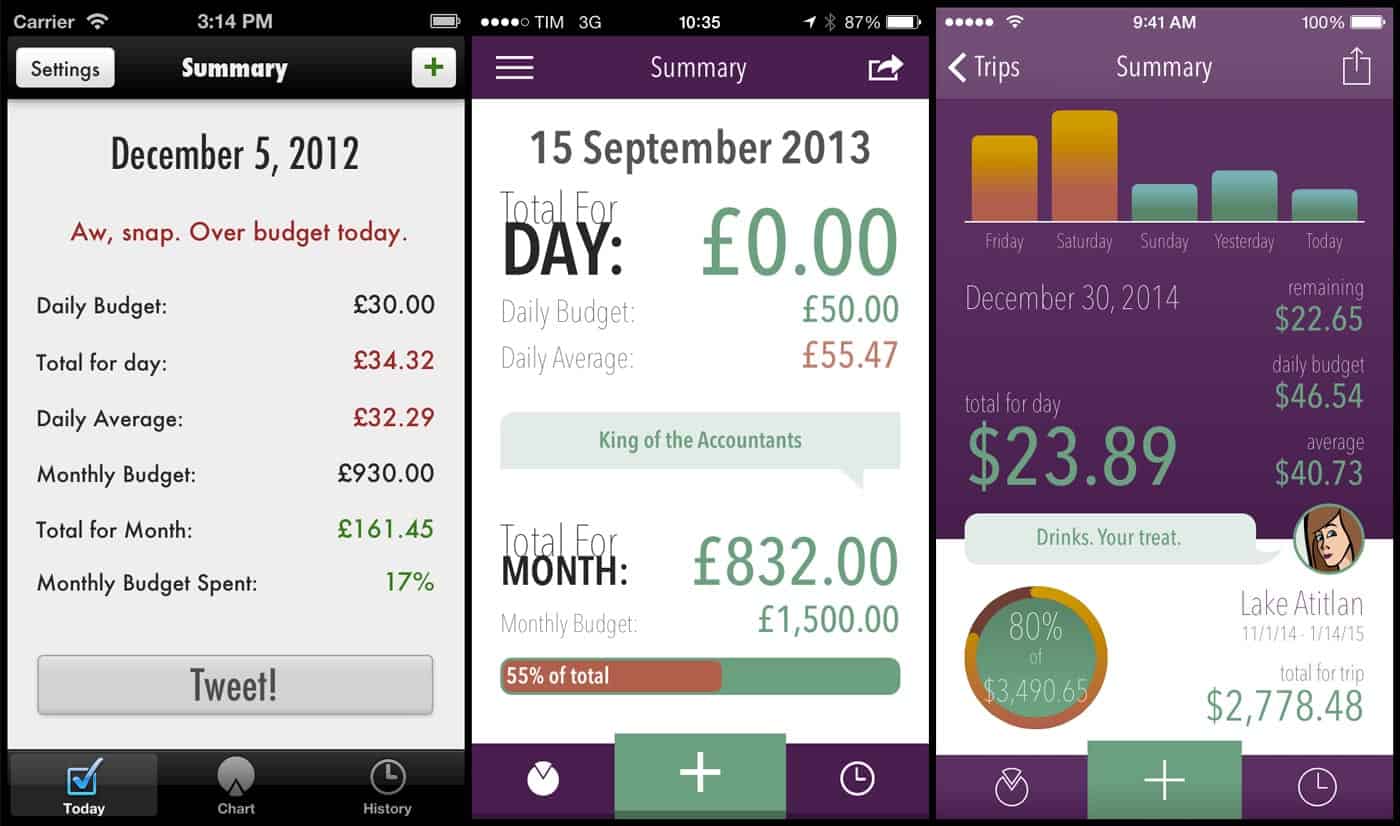
Three years ago today we released Trail Wallet 1.0 to the App Store. It was kind of plain-looking and had a few initial bugs but we had finished it and released it and it was ours.
Throughout the development, I was continually doing Hopeful Business Math which involved looking at our stats from Never Ending Voyage, figuring out what percentage of our audience was looking at it on a iOS device, and asking myself questions like "how much would we make if just 10% of those iOS users buy it?"
Depending on the percentages, we were on track to make betweeen £3,000 and £10,000 in our first month.
We made £141. The next month, we made £84.
Looking back, the reasons are obvious—it wasn't much to look at and there were some glaring omissions in terms of functionality. Some of the UI choices were...questionable (who wants to tweet their budget and, even if they did, did they need such a large button to do it?)
The world doesn't care about how long you spend on something, only how good it is, and, after the third month of earning less than £200, we had to decide whether or not to continue. The amount of time we had spent on it couldn't be a factor—it was how much future time we were willing to gamble on it.
The app in my head was pretty and fun and easy to use but with a depth that would satisfy even the most hardcore of budget fanatics. The app in the world was not that thing.
Ann Patchett, in her book This is the Story of a Happy Marriage, captures this feeling wonderfully:
This book I have not yet written one word of is a [butterfly] of indescribable beauty, unpredictable in its patterns, piercing in its color, so wild and loyal in its nature...and all I have to do is put it down on paper and then everyone can see this beauty that I see.
I reach up and pluck the butterfly from the air...and there, with my own hand, I kill it. It's not that I want to kill it, but it's the only way I can get something that is so three-dimensional onto the flat page...What I'm left with is the dry husk of my friend, the broken body chipped, dismantled, and poorly reassembled. Dead. That's my book.
Unlike most books, apps have the opportunity to become better over time. We can fix some of the poor reassembly, make this dead butterfly look a little more vibrant and bring it closer to what it looked like in our heads. In fact, apps are unique in that, not only can we do this, it's expected of us.
An app is a living, evolving thing and, at that time, it was a thing that looked nothing like I wanted it to. Of course we should continue.
I was fortunate in that the income from our other sources put us in a position where I could continue working on it full time but, even if I hadn't, I would have done it part time.
(I should stress that this income at that time was still relatively low for the UK/US—our Year 4 income was around £24,000 ($41,000) for two people, so it was still a risk.)
I love designing and building software. At University in the early 2000s, I built countless websites for my bands and all of my friend's bands. For one of our assignments, I built an interactive Flash app that showed you how all of the dials and buttons on a channel strip in a music studio mixing desk worked.
And now finally, I had made a thing and put it out into the world and some people had bought it. Not many, but those that did were supportive and enthusiastic and maybe even saw the potential in it that I saw.
There was no way I was going back to working for other people, either as an employee or as a freelancer. If needs be, we would move somwhere cheap and live off ramen noodles because we were going to make this work.
Now, three years later, the app still isn't the beautiful butterfly of my vision, but it's getting there. As my skills as an app developer have grown, so has the app and it now better reflects what I thought it could be.
And I belive it was the right call—it has now been downloaded over 61,000 times and has 331 mostly positive reviews, with an average of 4.5 stars worldwide.
It's been featured on the App Store, and in The Huffington Post, the Los Angeles Times, and the New York Times. It's still not making retirement money, but it is now carrying its weight.
Throughout the three years, there have been some severely difficult times when I considered quitting. The App Store is a cut-throat market and growing our income has been long and hard and slow. People can be incredibly mean in reviews. Mostly it's unwarrented but, every so often, totally understandable—say, after downloading a version that locked them out of the app when they had previously paid for it (not my finest hour).
But through it all, people have also left wonderful reviews, recommended it to their friends, reviewed it on their blogs and sent wonderful emails just to tell me how much they love it. Emails with no feature requests, no bug reports, no support requests. Just "I love your app. Thanks for making it."
Trail Wallet has given me so much that I am profoundly grateful for. Every time I come back to it, it's like returning to an old friend. It continues to challenge me to become a better developer and I still get excited about new features I could add and ways in which I can make it better. It has even opened up a pathway for me to start making video games, something that I am immensely excited about.
Most of all, it has given me the opportunity to make a living doing what I love. Even through the lowest moments, I cannot overstate how much I appreciate this immense privelege and it's all thanks to everyone who has bought it, used it, talked about it, sent in bug reports and feature requests, written blog posts about it, reviewed it, and rated it.
Thanks.
Simon


